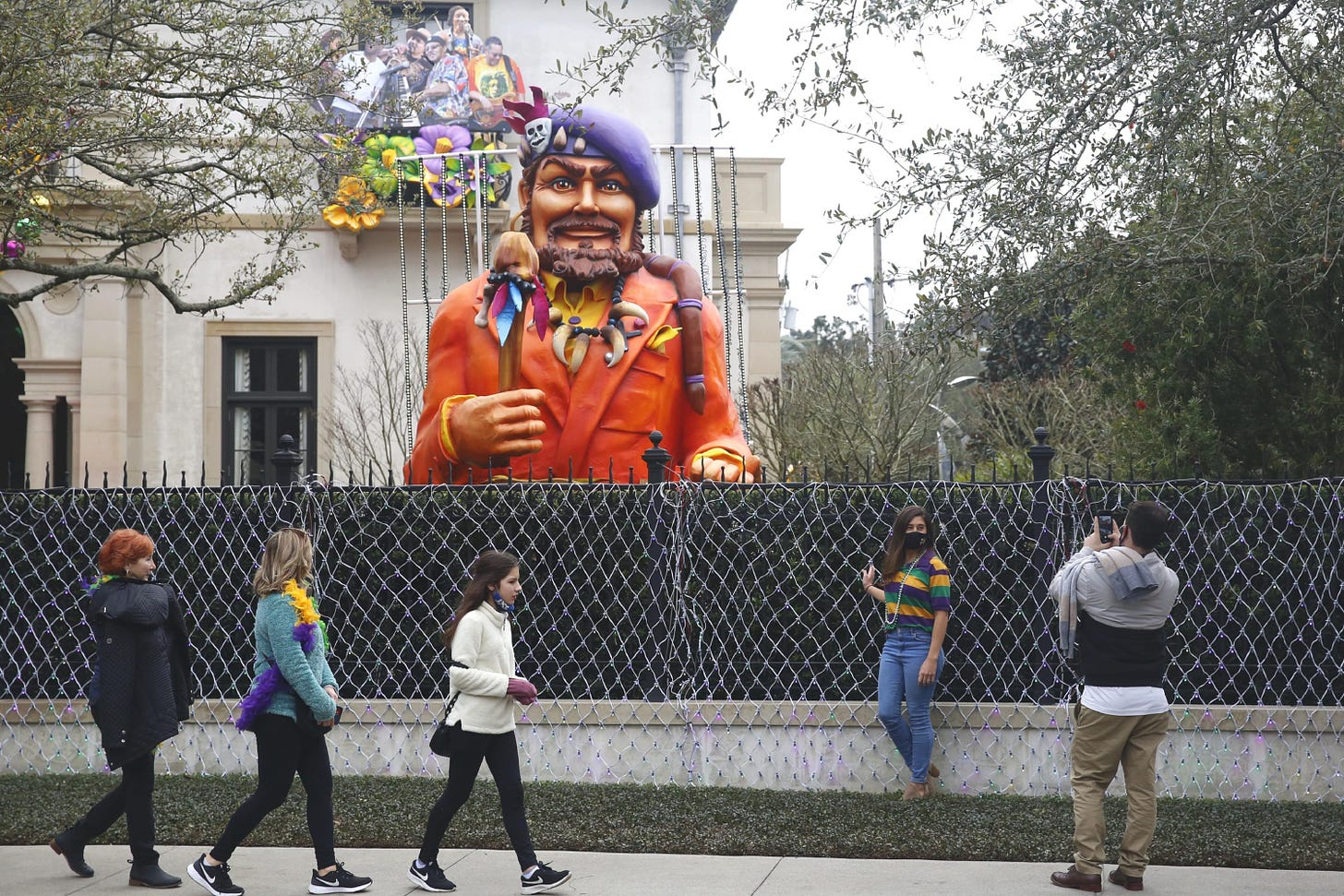They’ve decorated their houses and turned thousands of them into stationary Mardi Gras floats. No kidding.
The people of New Orleans refused to let COVID stop Mardi Gras—some are calling it Yardi Gras—even though the krewes couldn’t roll this year. Being a New Orleans ex-patriate, no matter where I am in the world, I pay attention to my hometown, follow the local news, live and die with the Saints, and mourn, pray, and celebrate with those back home. I’ve been gone a long time, but every year at Mardi Gras, I take notice, cook the food I grew up eating, express gratitude that people remember how to celebrate life. The next day on Ash Wednesday, I stop to consider the need for lamentation, repentance, renunciation, and reflection as we make the journey to Good Friday and Easter Sunday.
This year that rhythm is unbroken, but also different.
This past year was an annus horibillis: disease, death, hardship, injustice, unrest, division. I suspect every single family in America was afflicted in one way or another. And yet the people of New Orleans pushed forward with Mardi Gras. Why? Because, despite everything, we have to keep living and celebrating life.
I think a lot of us needed this reminder.
A million and a half people came to New Orleans for Mardi Gras last year, right as COVID was blooming. Mardi Gras became a super spreader event and prime example of what not to do in a pandemic. It was America’s last great public celebration before we descended into shut downs, sickness, mass death, and internal fights over the virus. We didn’t know it then, but you could have stood on the streets of the French Quarter during Mardi Gras 2019 and said that the lamps would soon be going out all across America.
And that they would not be lit again for a full year.
I went home to New Orleans in October to see my Dad, Terry Cross. He’d had heart surgery and his recovery didn’t go well. His short stay in a rehab center turned into a longer stay in a residential care facility. Then, COVID hit hard in March and he was stuck.
He needed regular care, but, like so many others with their loved ones in nursing homes, I couldn’t visit him. COVID made its way into his facility through the nurses and by July he had it. He recovered quickly, but had lingering complications: a fall, a brain bleed, emergency surgery, then pneumonia. The facility opened up for visitors for the first time in October, and I came running.
I didn’t realize it during our visit, but COVID had weakened his lungs. His pneumonia was more serious than the doctors thought. By Thanksgiving week, he was hospitalized with respiratory failure. He had double pulmonary embolisms. Then cardiac failure. The day after Thanksgiving, he passed away at age 77.
The nurses told me they were seeing this a lot. A patient would get COVID, recover, and then a couple of months later come into the hospital with all kinds of complications related to COVID. And that’s what happened to my Dad.
Terry Cross was born in New Orleans in 1943. My grandfather labored as a pipe fitter in the shipyards that built the vessels that would help us win the war. My grandmother was a devout Christian who worked in a factory making cork tops for bottles. They rented houses around the city as he grew up. My Dad loved New Orleans food and culture, as did my mother, and even though we moved outside of the city, we were always connected to it. Shaped by the place in a way that wouldn’t let us go.
New Orleans tends to do that to people. This connection is built through family, food, music, tragedy, celebration, ethnic and racial diversity, and the way people cope with loss. Other cities defined by history turn into museums, where you can’t sit on the furniture or touch anything, lest you break it forever. But that’s not New Orleans. The city has been broken and put back together so many times that, as Leonard Cohen put it, the cracks are how the light gets in.
Right now the cracks are all around us.
As we reach half a million dead from COVID this week, I lament and think about my father’s life and death, what has been lost, the ongoing strife that we are still working through as a nation, confusion about the future, and questions about where we go from here.
But, in New Orleans this week, thousands of homes are decorated to celebrate anyway. To love what remains of life, even in the midst of death.
On Wednesday comes the lament of Lent.
But it will be followed, eventually, by the Resurrection.
New Orleans knows this. The rest of us needed to be reminded of it.




